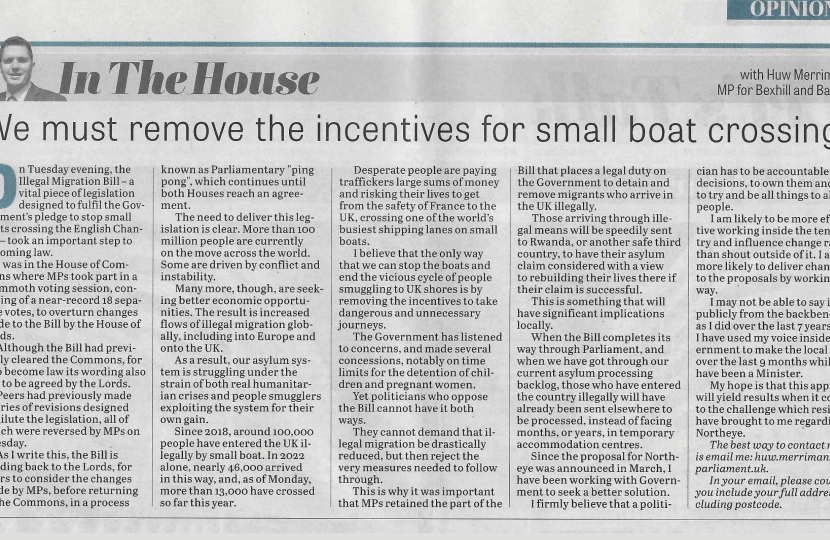
On Tuesday evening, the Illegal Migration Bill – a vital piece of legislation designed to fulfil the Government’s pledge to stop small boats crossing the English Channel – took an important step to becoming law. I was in the House of Commons where MPs took part in a mammoth voting session, consisting of a near-record 18 separate votes, to overturn changes made to the Bill by the House of Lords.
Although the Bill had previously cleared the Commons, for it to become law its wording also has to be agreed by the Lords. Peers had previously made a series of revisions designed to dilute the legislation, all of which were reversed by MPs on Tuesday. As I write this, the Bill is heading back to the Lords, for Peers to consider the changes made by MPs, before returning to the Commons, in a process known as Parliamentary "ping pong", which continues until both Houses reach an agreement.
The need to deliver this legislation is clear. More than 100 million people are currently on the move across the world. Some are driven by conflict and instability. Many more, though, are seeking better economic opportunities. The result is increased flows of illegal migration globally, including into Europe and onto the UK. As a result, our asylum system is struggling under the strain of both real humanitarian crises and people smugglers exploiting the system for their own gain.
Since 2018, around 100,000 people have entered the UK illegally by small boat. In 2022 alone, nearly 46,000 arrived in this way, and, as of Monday, more than 13,000 have crossed so far this year. Desperate people are paying traffickers large sums of money and risking their lives to get from the safety of France to the UK, crossing one of the world’s busiest shipping lanes on small boats.
I believe that the only way that we can stop the boats and end the vicious cycle of people smuggling to UK shores is by removing the incentives to take dangerous and unnecessary journeys.
The Government has listened to concerns, and made several concessions, notably on time limits for the detention of children and pregnant women. Yet politicians who oppose the Bill cannot have it both ways. They cannot demand that illegal migration be drastically reduced, but then reject the very measures needed to follow through.
This is why it was important that MPs retained the part of the Bill that places a legal duty on the Government to detain and remove migrants who arrive in the UK illegally. Those arriving through illegal means will be speedily sent to Rwanda, or another safe third country, to have their asylum claim considered with a view to rebuilding their lives there if their claim is successful.
This is something that will have significant implications locally. When the Bill completes its way through Parliament, and when we have got through our current asylum processing backlog, those who have entered the country illegally will have already been sent elsewhere to be processed, instead of facing months, or years, in temporary accommodation centres.
Since the proposal for Northeye was announced in March, I have been working with Government to seek a better solution. I firmly believe that a politician has to be accountable for decisions, to own them and not to try and be all things to all people. I am likely to be more effective working inside the tent to try and influence change rather than shout outside of it. I am more likely to deliver changes to the proposals by working this way.
I may not be able to say it publicly from the backbenches, as I did over the last 7 years, but I have used my voice inside Government to make the local case over the last 9 months whilst I have been a Minister. My hope is that this approach will yield results when it comes to the challenge which residents have brought to me regarding Northeye.



